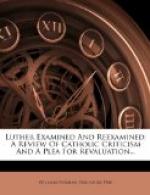It is true, indeed, that the manners of the age of Luther were generally rough. Even in polite society language was freely used that would make us gasp. Coarse terms evidently were not felt to be such. In their polemical writings the learned men of the age seem to exhaust a zoological park in their frantic search for striking epithets to hurl at their opponent. It was an age of strong feeling and sturdy diction. It is also true that Luther was a man of the people. With a sort of homely pride he used to declare: “I am a peasant’s son; all my forbears were peasants.” But all this does not sufficiently explain Luther’s “coarseness.”
Most people that criticize Luther for his strong speech have read little else of Luther. They are not aware that in the, great mass of his writings there is but a small proportion of matter that would nowadays be declared objectionable. Luther speaks through many pages, yea, through whole books, with perfect calmness. It is interesting to observe how he develops a thought, illustrates a point by an episode from history or from every-day life, urges a lesson with a lively exhortation. He is pleasant, gentle, serious, compassionate, artlessly eloquent, and, withal, perfectly pure in all he says. When Luther becomes “coarse,” there is a reason. One must have read much in Luther, one should have read all of Luther, and his “billingsgate” will assume a different meaning. If there is madness in his reckless speech, there is method in it. One must try and understand Luther’s objective and purpose.
Luther had a very coarse subject to deal with, and Luther believed that a spade is best called a spade. Luther never struck at wickedness with the straw of a fine circumlocution. He believed that he had the right, yea, the duty, to call coarse things by coarse names; for the Bible does the same. Luther has called the gentlemen at the Pope’s court in his day some very descriptive names. He did not merely insinuate that the cardinals of his day were no angels, but said outright what they were. He did not feebly question the holiness of His Holiness, but he called some of the Popes monsters of iniquity and reprobates. We shall show anon that in that age there lived men who spoke of the same matters as Luther, who told tales and used expressions that would render their writings unmailable to-day.
The great men of any age are products of that age. Man is as much the creature of circumstances as circumstances are the creatures of men— Disraeli to the contrary notwithstanding. While men may create situations, they may also be made to fit into a situation. Men have become great for this very reason that they understand the spirit of their age and were able to respond to its call. Back of both men and circumstances, however, stands sovereign Providence, shaping our ends, rough-hew them how we will.




